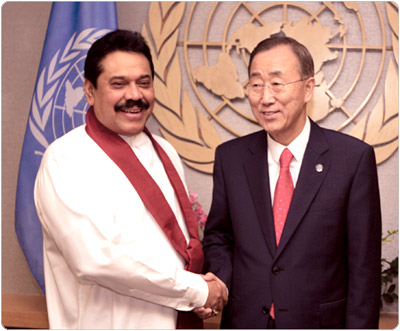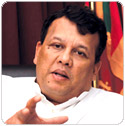Reaching the peak of human rights protection
Sandasen MARASINGHE
Since he assumed the duties, President
Mahinda Rajapaksa has taken utmost pains to establish a strong
foundation of human rights. While the humanitarian operation was in
full swing, President Rajapaksa assigned Minister Mahinda
Samarasinghe to handle human rights issues. Daily News spoke to
Minister Samarasinghe on his experience with working under the
President.
|

President Mahinda Rajapaksa meets UN Secretary General Ban Ki
Moon |
It is my privilege to recall, on this
most auspicious of occasions, the contribution that President Mahinda
Rajapaksa has made to the sphere of human rights in Sri Lanka. It is
merely six years since President Rajapaksa took office but we have, as a
country, journeyed far under his inspiring leadership. He provided us
with the means of overcoming the greatest threats to human rights –
terrorism and conflict. It was his unswerving commitment to defeat the
forces of terrorism that enabled Sri Lankans from the North, South, East
and West, to breathe the air of true freedom.
An entire generation of our people had grown up knowing nothing but
terrorism and the fear of violence; a terrible fate which we will
fortunately not bequeath to succeeding generations due to President
Rajapaksa’s clarity of vision and the heroic sacrifice of many. We have,
in a relatively brief period, guaranteed to all our people the freedom
from fear – one of the integral components of human rights. It is the
President’s dedication that enabled us to take such giant strides
forward as a people and as a nation.
The nation’s mind is now focused on the corresponding freedom - that
is the guaranteeing of the freedom from want. President Rajapaksa’s
vision in this respect is based on fostering speedy economic growth
which will benefit the people of this country who have, for too long,
been deprived of the fruits of equitable, inclusive and participatory
development. In a time of global economic instability, that has
adversely affected many advanced nations, we have managed to achieve
around 8 percent growth in our gross domestic product (GDP) despite the
necessary investment in post conflict reconstruction and restoration of
conflict affected areas.
|
The nation’s mind is now
focused on the corresponding freedom - that is the guaranteeing
of the freedom from want. President Rajapaksa’s vision in this
respect is based on fostering speedy economic growth which will
benefit the people of this country who have, for too long, been
deprived of the fruits of equitable, inclusive and participatory
development. |

Minister Mahinda Samarasinghe
|
We are confident that the Sri Lankan people, irrespective of
ethnicity, language, creed, culture or geographical location, can enjoy
economic wellbeing and the opportunity to aspire to upward mobility and
prosperity. Poverty is one of the most debilitating factors when it
comes to enjoyment of human rights. The high-flown theoretical rhetoric
on human rights means very little if the deficiency of basic necessities
and the lack of choice are a reality in the ordinary person’s existence.
This is the challenge that President Rajapaksa has taken on and tasked
his Government to deal with.
The association of President Rajapaksa with human rights issues is
not a recent phenomenon. As an Opposition politician and a member of the
legal fraternity, he took pains to seek redress for the victims of the
violence of the late nineteen-eighties. He personally brought cases of
disappearance, extra judicial executions and other human rights
violations to the attention of the international community.
He transmitted evidence of these violations to international human
rights bodies and sought relief for those who suffered during a dark
period of our nation’s history. He was a leader of a movement that gave
voice to the voiceless amidst a climate of fear and repression. These
principles characterize his leadership to this day.
Even when the armed conflict was thrust upon us in 2006 due to the
mala fide actions of the Liberation Tigers of Tamil Eelam (LTTE),
President Rajapaksa did not overlook the importance of ensuring the
rights of ordinary citizens. The Presidential Directive on Arrest and
Detention was issued in that year and reissued in 2007. This was
communicated to the security forces and police and provided an important
safeguard against abuse of human rights.
Moreover, President Rajapaksa fully endorsed the Consultative
Committee on Humanitarian Assistance (CCHA), which I chaired throughout
the period of armed conflict: a mechanism that brought together key
agencies of the Sri Lankan Government, bilateral and multilateral
partners, to ensure that the needs of the civilian populace in the
conflict-affected areas were fully met.
President Rajapaksa’s dedication to human rights protection was not
limited to mere practical short-term measures. In his 2005 manifesto,
“Mahinda Chintana”, he pledged to formulate a new Bill of Rights to be
incorporated into the Constitution in keeping with our international
commitments.
He tasked the former Ministries of Disaster Management & Human Rights
and Constitutional Affairs & National Integration with delivering this
draft.
After four years of effort and consultation of some of the foremost
experts in the country I, as Minister in charge of the subject of human
rights, was pleased to receive a comprehensive draft that was fully in
accord with the international human rights conventions that we are State
Party to.
This was duly submitted to the President for his consideration.
Several aspects of this initiative have been incorporated into the
National Human Rights Action Plan on the Promotion and Protection of
Human Rights (NHRAP) which will be launched in the near future.
It is well known that the LTTE’s international lobby, its support
groups and elements among the Tamil diaspora brought intense pressure to
bear on Sri Lanka during the armed conflict’s final phases and in its
aftermath.
Politicians and policy makers in Western countries were pressured to
call a halt to the humanitarian operation. After the end of the
conflict, these groups are now engaged in another campaign to impede the
reconciliation and reconstruction processes and to denigrate the
achievement of the Government and security forces in defeating
terrorism.
Throughout that period and even to this day, I have been engaged in
countering this vicious propaganda and slanderous campaign against Sri
Lanka – formerly as Minister for Human Rights and now as Special Envoy
of the President. At every critical point during the past six years, I
sought the advice and guidance of President Rajapaksa who has given me
the backing and support that helped us achieve the several victories Sri
Lanka has gained in Geneva and at other international human rights
forums.
President Rajapaksa has set in motion a process of reconciliation and
renewal. Human rights protection will form an integral part of this
exercise. One of the most significant of our efforts in this regard has
been the NHRAP – which has been endorsed by the Cabinet and which we
will very shortly commence implementing.
During the process of formulation, in furtherance of a pledge made to
this effect in 2008 in the UN Human Rights Council in Geneva, I
consulted the President at every juncture, benefitting from his vast
experience in this sphere.
The Action Plan, including and enhanced by constitutional reform,
will enable us to move forward, during the ensuing five years, in a
structured and systematic manner to ensure that our people benefit from
improved promotion and protection of human rights. |